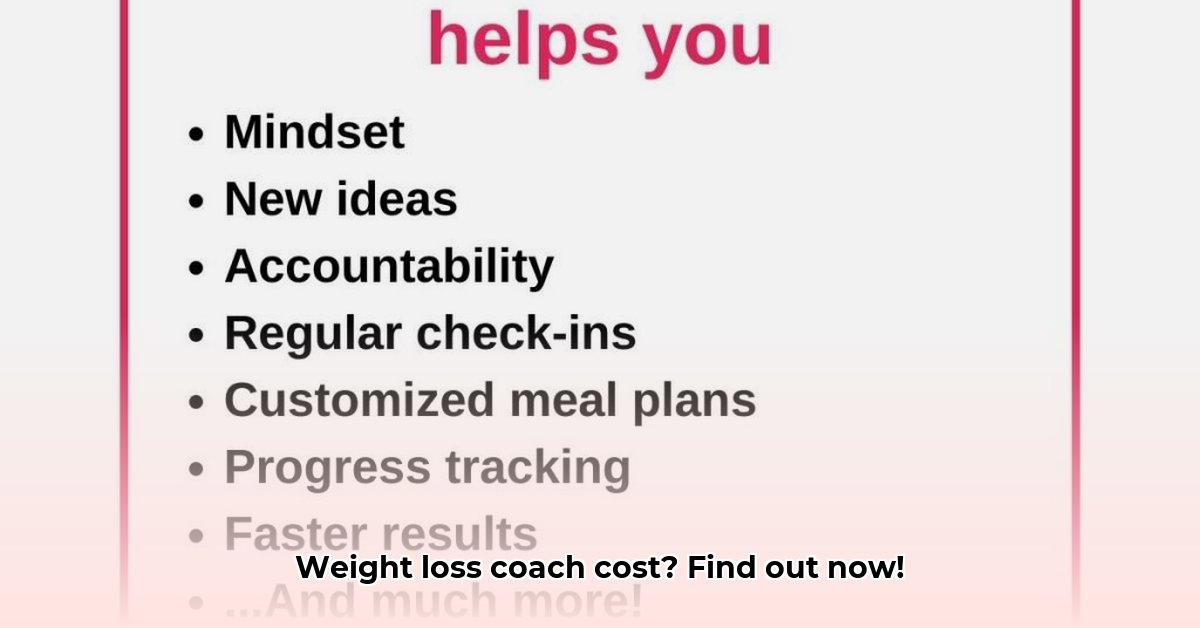
Thinking about hiring a weight loss coach but unsure about the cost? This comprehensive guide breaks down the pricing landscape, helping you determine if a weight loss coach aligns with your budget and find the right professional for your needs. We’ll explore various pricing models, factors influencing cost, how to choose a qualified coach, and future trends in this evolving field.
What Influences the Price of Weight Loss Coaching?
Several key factors significantly impact the cost of weight loss coaching services. Understanding these variables empowers you to make informed decisions and find a coach that fits your budget.
Coach Expertise and Certifications: Experienced coaches with proven track records and relevant certifications (e.g., Certified Wellness Coach, Registered Dietitian) typically charge more than those just starting out. Their expertise and years of experience justify the higher cost. A seasoned professional brings a wealth of knowledge and refined techniques, potentially leading to faster and more sustainable results.
Geographic Location: Coaching services in major metropolitan areas usually command higher fees compared to smaller towns or rural areas due to higher operating costs and market demand in these locations.
Type of Sessions (Individual vs. Group): Private, one-on-one sessions are generally more expensive than group sessions. The personalized attention and tailored strategies in individual coaching justify the higher price tag. Group coaching, while offering less individual attention, provides a cost-effective alternative. Online coaching falls somewhere in between, offering personalized attention in a more affordable package.
Program Duration and Intensity: Longer programs naturally cost more. Intensive programs, offering more frequent sessions and additional resources, also carry higher price tags. Remember; sustainable weight loss is a journey, not a sprint. Longer-term commitments may yield more significant and lasting results.
Understanding Different Pricing Structures
Weight loss coaches utilize diverse pricing models to accommodate various budgets and preferences:
Per Session: Many coaches charge per session, with prices ranging from $50 to $300 or more, depending on the coach's experience and location. This provides flexibility but can become expensive over time.
Monthly Packages: Coaches often offer monthly packages, bundling multiple sessions, ongoing support, and additional resources for a fixed monthly fee. This structure provides a predictable cost and often better value. Costs typically range from $200 to $1000+ per month, depending on the package's intensity and support level.
Group Programs: Group coaching programs present the most budget-friendly option, significantly lowering the cost per session compared to individual coaching. However, this usually comes at the expense of less individualized attention.
Is Investing in a Weight Loss Coach Worth It? Assessing the Return on Investment (ROI)
While the initial investment may seem substantial, the long-term benefits extend beyond weight loss. A qualified weight loss coach offers more than just a diet plan:
Tailored Support & Accountability: Coaches provide personalized support, strategies, and accountability, crucial for achieving and maintaining weight loss goals.
Sustainable Lifestyle Changes: They help establish sustainable lifestyle changes, influencing long-term health and well-being.
Improved Health Outcomes: Weight loss reduces the risk of chronic diseases, resulting in substantial health improvements.
Increased Energy & Well-being: Sustainable weight management leads to increased energy levels and an improved mood, enhancing overall quality of life.
The return on investment isn't just about the numbers on the scale; it’s about lasting health improvements and a better quality of life. Many find that the long-term benefits significantly outweigh the initial financial commitment.
Choosing the Right Weight Loss Coach for You
Selecting the right coach is critical for achieving lasting results. Here's a step-by-step approach:
Define Your Needs and Budget: Clarify your weight loss goals, preferred coaching style (in-person, online, group), and your budget.
Research Potential Coaches: Thoroughly research potential coaches, checking their credentials, certifications, client testimonials, and their coaching philosophies.
Schedule Consultations: Many coaches offer free consultations. This allows you to assess their communication style, approach, and whether they are the right fit for you.
Analyze Their Approach and Value: Compare the cost to the value offered – consider the coach's qualifications, experience, offered resources, and client success stories.
Prioritize Fit and Rapport: Ensure you feel comfortable and confident in their approach and communication style. A positive and supportive relationship is crucial for success.
Making Weight Loss Coaching More Affordable
Several strategies can make weight loss coaching more accessible:
Explore Payment Plans: Many coaches offer payment plans or installments to spread out the cost.
Check Insurance Coverage: Some insurance plans may partially or fully cover nutrition counseling, which overlaps significantly with weight loss coaching.
Consider Group Coaching: Group programs typically offer a more budget-friendly option than individual sessions.
Look for Deals & Discounts: Keep an eye out for seasonal promotions, introductory offers, or package deals that might reduce the overall cost.
Future Trends in Weight Loss Coaching
The weight loss coaching industry is continuously evolving. Expect to see increased:
Technological Integration: Increased use of technology, such as fitness trackers, apps, and virtual coaching platforms, making coaching more accessible and convenient.
Personalized Programs: Tailored programs integrating genetic testing and other data to personalize approaches.
Insurance Coverage Expansion: A greater likelihood of insurance companies covering weight loss support services.
Conclusion: Investing in Your Well-being
The cost of weight loss coaching is an investment in your overall health, well-being, and long-term quality of life. Carefully consider the long-term benefits against the initial cost, aligning your choice with your needs, budget, and preferred coaching style. Remember, the most expensive option isn't necessarily the best; finding a supportive and skilled coach who's the right fit for you is paramount for success.